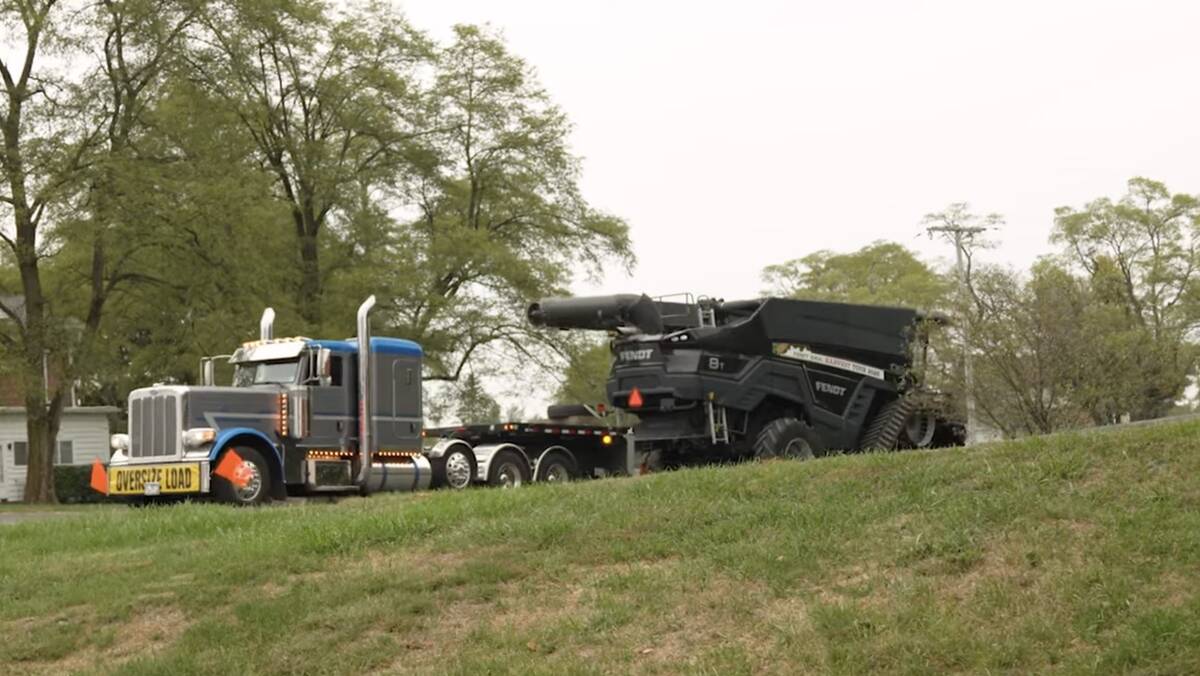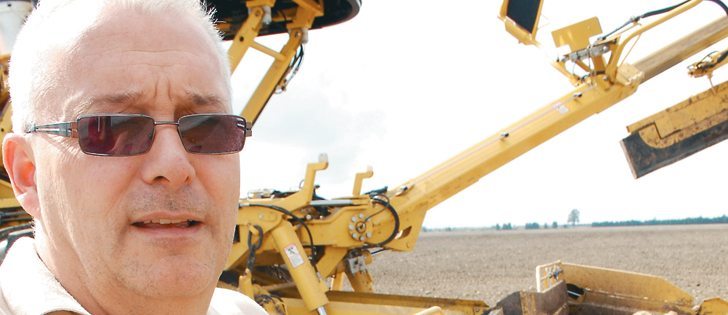Many farms today have natural gas pipe lines reaching into the yard.
So how long before agricultural implements fueled by natural gas hit the market?
When the pipelines began spreading out across rural Canada, most farmers thought of their grain dryers first and shop heat second. But the technology is also well developed to fuel trucks, buses and mining and construction equipment.
Cummins ISX engines fueled by liquefied natural gas are now available as a factory installed option in Kenworth T800, Peterbilt 367, 386, 387 and Freightliner M2-112 trucks.
Read Also

Fendt takes a combine on the road in the U.S.
Putting an Ideal combine in fields across different regions has given the brand a chance to prove that the combine is capable of performing well in a variety of conditions.
Cummins Westport in Vancouver builds the engines. The original Westport company was set up to guide the diesel world into spark-ignited gaseous fuels such as propane, hydrogen and natural gas. Cummins and Westport are equal partners in the ISX natural gas project.
The engines are marketed as Westport GX by Cummins. The GX natural gas engines range from 250 horsepower to 320 h.p. The 8.9 litre engine has a 12:1 compression ratio.
Engineers on the joint venture project started with a Cummins ISX engine and applied a Westport designed, high-pressure injection system and spark ignition.
The modification gave them greenhouse gas and emissions numbers substantially lower than 2007 standards set by the American Environmental Protection Agency for heavy-duty highway applications. Fuel economy is equal to or better than the original ISX engine.
A natural gas engine is a combination of a spark-fired gasoline engine and a compression-fired diesel engine. Because the GX engines are based on the Cummins diesel and use many of the same components as the parent diesel engine, they have diesel durability and the same Cummins warranty.
Differences can be found in the fuel system parts, the ignition system and the electronic control module. Parts such as the piston and ring pack, the cylinder head and camshaft have also been changed for natural gas. GX engines use existing Cummins exhaust gas recirculation (EGR) technology, with a three-way catalyst to improve efficiency and lower costs.
GX engines operate with a leaner air to fuel mixture, resulting in lower emissions, but with diesel-like power and torque needed for a heavy-duty applications, says Cummins Westport. As a result of the spark ignition, they are quieter than their diesel counterparts.
Typically, a spark ignited compressed natural gas engine will have lower fuel economy than its diesel engine counterpart.
This efficiency loss is usually more than offset by a lower natural gas fuel cost resulting in a lower fuel cost per mile.
There are more than 20,000 GX engines worldwide, all in on-road vehicles. Compared to diesel power, GX customers report less oil consumption, improved idling, longer intervals between service calls and lower overall cost per mile.
Cummins Westport says liquefied natural gas engines will be an economic advantage in the future as diesel engines require more expensive and advanced technologies to meet stricter emissions standards.
If natural gas works so well in commercial trucks, why can’t it be used to fuel farm tractors, combines, sprayers and grain trucks?
“There’s no real technical reason natural gas can’t be used in farm implements. In fact, we have done some tractors in South America,” says Jeff Campbell, Canadian sales manager for Cummins Westport.
“The big challenge is fuel storage and delivery. You need large tanks to hold compressed gas. It’s not feasible to install big bulky natural gas tanks on farm implements.
“Cummins has had a division for off-road mining and construction for years. But all those machines operate close to a refueling depot,” says Campbell.
“The easiest way would be natural gas in the compressed form, but on-farm storage and handling would still be a major issue. You would still be hanging lots of big cylinders on your tractor.”
North American farmers are used to carrying large tanks with anhydrous ammonia, so the possibility of adapting those systems to natural gas are likely, say analysts.
Natural gas is safer than gasoline, according to Cummins Westport.
Natural gas is lighter than air and dissipates upward into the atmosphere. Gasoline and diesel drip and drop to the ground. In the event of a leak, natural gas dissipates rapidly. And, unlike gasoline, it is non-toxic.
Natural gas fuel systems are sealed. There are no releases of natural gas from the vehicle to the atmosphere, either during operation or while parked.
Refueling connectors are designed to stop the release of natural gas during refueling. For example, if the seal between the refueling hose and the vehicle is broken by inadvertently driving away from the refueling station with the hose attached, the flow of natural gas stops.
CNG is compressed natural gas. It’s commonly used to heat homes and run appliances.
On vehicles, CNG is stored in a tube-shaped storage tank, typically located where the conventional fuel tank would be. Natural gas is most commonly used in this form.
LNG is liquefied natural gas. It has been cooled into a liquid form so it takes less space to transport and store. It’s often used for longer-range applications. The high energy density of LNG is better for heavier duty applications.
LNG is typically transported globally in tankers, and then connected to on-shore natural gas infrastructure where it’s sold as LNG or compressed and sold as CNG.
LPG is liquid propane gas. It’s a by-product of natural gas processing and petroleum refining. It’s gaseous at normal temperatures and liquefies at relatively low pressures. Like natural gas, it burns cleaner than gasoline or diesel.
Because of the complexity of the modifications to the basic ISX motor, Cummins Westport does not offer modifications to existing diesel engines.
For more information call Cummins Westport at 604-718-2000 or visit www.westport.com.















